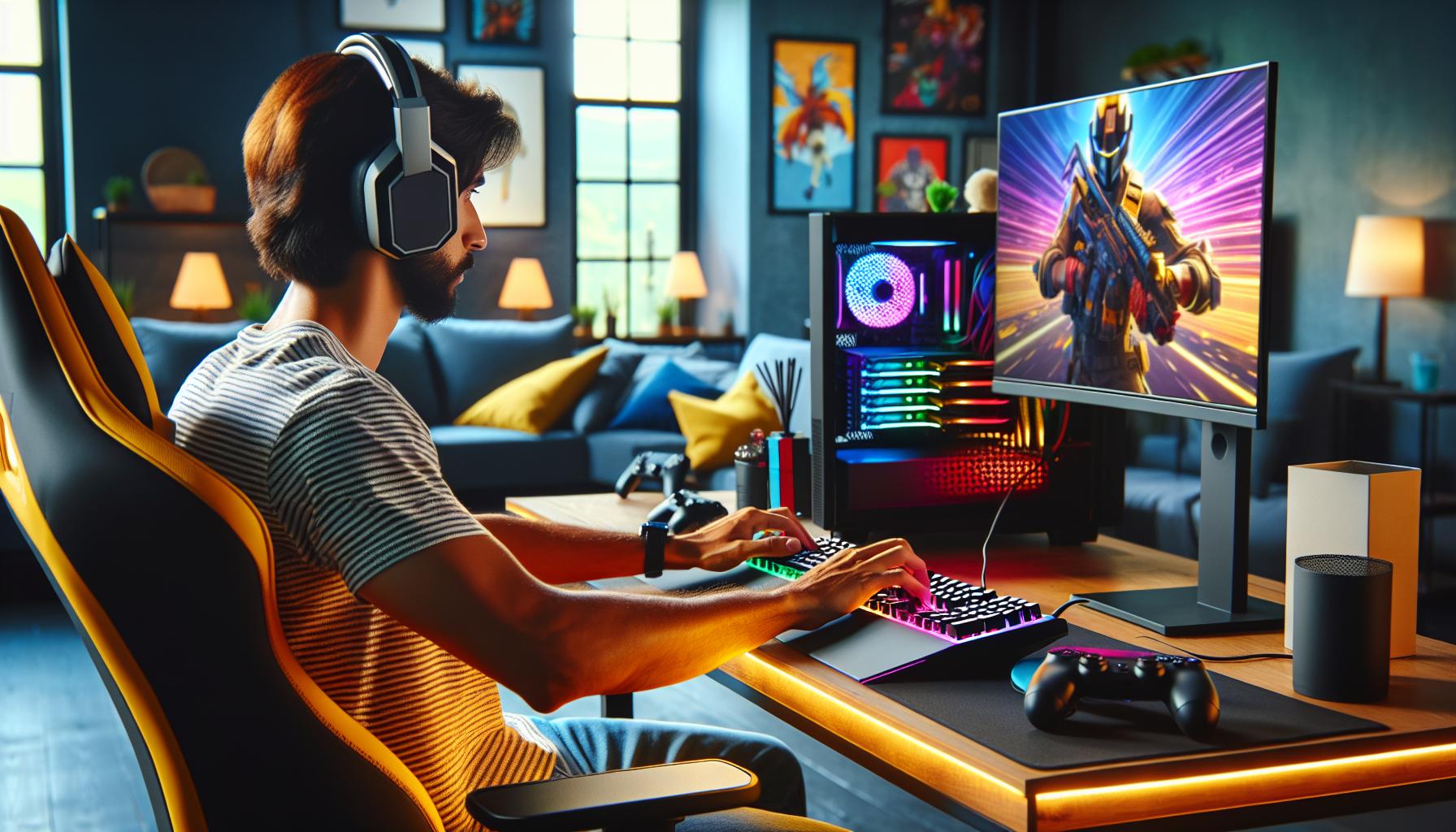Phone:
(701)814-6992
Physical address:
6296 Donnelly Plaza
Ratkeville, Bahamas.

In the epic showdown of PC gaming versus console gaming, the debate rages on like a never-ending boss fight. Gamers everywhere are torn between the sleek power of a custom-built rig and the convenience of a cozy console setup. Each side boasts its own loyal fanbase, armed with passionate arguments and a few too many memes to count.
PC gaming offers flexibility and customization. Gamers can upgrade hardware, choose peripherals, and tailor settings. In contrast, console gaming provides a plug-and-play experience. Users enjoy streamlined access to games without complex setups.
Performance often varies between the two platforms. High-end PCs frequently deliver superior graphics and frame rates. Consoles, however, optimize games for specific hardware, ensuring consistent performance.
Game libraries differ across platforms. Many titles launch on both PC and consoles, but some remain exclusive. PC gamers benefit from a broad range of indie games and mods. Console players appreciate exclusive first-party titles, providing unique experiences.
Community is another significant aspect. PC gamers often engage in forums and online groups, sharing tips and strategies. Console gamers connect through built-in services, enabling multiplayer experiences with friends easily.
Cost implications impact choices as well. Entry-level gaming PCs can exceed the price of consoles, particularly when upgrading components. On the other hand, consoles typically require no substantial investment beyond the initial purchase, making them more accessible.
Lastly, user experience varies. PC gaming allows extensive control over settings and customization, appealing to dedicated enthusiasts. Consoles focus on convenience, providing an intuitive interface and remote control for casual players.
Understanding these distinctions aids gamers in making informed choices, aligning preferences with performance, community, and cost factors.

The distinction between PC and console gaming revolves around several critical aspects.
PCs offer extensive hardware customization options. Gamers can tailor their builds with powerful components like advanced processors and high-end graphics cards. In contrast, consoles feature fixed hardware, typically optimized for specific games. While PCs deliver superior graphics and higher frame rates, consoles ensure consistent performance across titles due to their standardized components. Gamers often appreciate the ability to upgrade PCs over time, but this flexibility comes with a higher initial cost.
Game libraries vary significantly between the platforms. PCs host a vast array of indie games and mods, catering to diverse tastes and preferences. Meanwhile, consoles deliver exclusive titles from first-party developers, which often attract dedicated fanbases. Multi-platform games generally exist on both systems, providing gamers with major releases. Additionally, Digital storefronts on PCs frequently offer sales and bundles, making it easier to access titles at lower prices. This variety in game availability influences player choices and preferences in the gaming community.

User experience in gaming significantly shapes preferences for PC or console. Key elements include control schemes and customization options.
Control schemes differ between PC and console gaming, influencing gameplay experiences. Gamers using PCs often play with a keyboard and mouse, offering precision in first-person shooters and strategy games. Many PC titles enable players to remap keys for personalized setups. Despite this, console gamers benefit from standardized gamepads, which provide ergonomics for extended play. Console controllers generally feature built-in vibration and motion controls, enhancing immersion. Cross-platform compatibility allows some games to support both control schemes, accommodating diverse player preferences.
Customization options vary substantially between platforms. PC gaming offers extensive hardware upgrades and settings adjustments. Gamers can swap out graphics cards, CPUs, and RAM for optimal performance tailored to their needs. Software settings allow modifications to resolution, frame rates, and graphics quality, enhancing visual appeal further. Contrarily, consoles prioritize user-friendliness, limiting hardware changes. While consoles offer minor system adjustments, gamers primarily utilize presets designed for efficiency. In contrast, the PC environment fosters a community focused on mods and user-generated content, expanding gameplay experiences vastly.
Performance and graphics in gaming often define the overall experience for players. Understanding these differences between PC gaming and console gaming proves essential for informed decisions.
Resolution and frame rates significantly impact gaming experiences. PCs typically support higher resolutions like 1440p or 4K, providing sharper visuals. Frame rates also reach competitive levels; high-end gaming PCs often achieve 144 frames per second (FPS) or higher in demanding titles. Consoles, on the other hand, usually optimize games for stable performance, often targeting 30 to 60 FPS. Titles designed for consoles prioritize consistent frame rates for smoother gameplay. Additionally, some newer consoles support 120 FPS and 120Hz refresh rates, advancing graphics capabilities. Players looking for breathtaking visuals should consider PC setups, whereas those valuing consistency might favor console performance.
Upgradability distinguishes PC gaming from console gaming significantly. Custom-built PCs allow users to swap components like graphics cards, processors, or RAM easily, ensuring performance enhancements over time. Gamers can invest in the latest technology for an improved experience. Consoles typically offer fixed hardware, restricting upgrades to the platform as a whole. Therefore, while consoles may deliver great experiences initially, they often lag behind PCs as technology advances. Some console manufacturers release new models, but these come at a premium cost. Dedicated enthusiasts often find PCs appealing due to the freedom offered in upgrading components according to individual needs. Thus, upgradability remains a crucial factor for long-term performance and graphics improvements in gaming.
Cost plays a significant role in the decision between PC gaming and console gaming. Initial investments and long-term expenses differ substantially between the two platforms.
A console typically offers a lower entry point, with prices ranging from $299 to $499. This cost includes everything needed for gameplay, providing a straightforward setup. In contrast, a gaming PC often starts around $800 for basic configurations and can rise into the thousands for high-performance models. Costs for peripherals such as monitors, keyboards, and mice add to the overall expense of PC gaming. Price fluctuations occur with hardware and specific configurations, potentially impacting the initial decision for gamers.
Ongoing costs for consoles generally focus on subscriptions for online services and game purchases. Services like Xbox Live or PlayStation Plus average $60 annually, allowing access to multiplayer features and exclusive discounts. On the other hand, PC gaming incurs varying expenses depending on upgrades and maintenance. Graphics cards and processors may require replacement every few years, costing hundreds of dollars. Additionally, frequent sales often allow PC gamers to acquire titles at lower prices, offsetting some long-term expenses.
Choosing between PC gaming and console gaming ultimately depends on individual preferences and priorities. Gamers who value customization and performance might lean towards PCs, while those who prefer simplicity and ease of use may find consoles more appealing. Each platform offers unique advantages that cater to different styles of play.
Understanding the nuances of both options can help gamers make informed decisions that align with their gaming habits. Whether it’s the thrill of building a powerful gaming rig or the joy of diving into exclusive console titles, the gaming experience remains rich and diverse across both platforms. Ultimately, the best choice is the one that brings the most enjoyment and satisfaction.